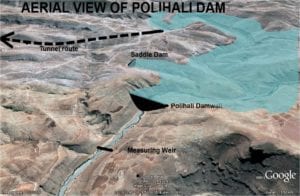Pictured: Aerial view of Polihali dam
Speaking at African Utilities Week last week the Minister of Water and Environmental Affairs, Edna Molewa announced that construction on the R12billion second phase of the Lesotho Highlands Water Project (LHWP) will begin within months. The project, which will secure a continued supply of water for South Africa, and hydroelectric power for Lesotho, was approved in principle by the two countries this week. The project will be a boost for South African and Basotho construction and materials supply companies and should create thousands of jobs. It will also provide South Africa with much-needed water security, one of the challenges highlighted in the government’s National Development Plan. Molewa has confirmed that the project would go ahead for completion by August 2020. Officials within her department say South Africa would bear the full R12billion cost of the project, sharply higher than the initial R9billionestimate, and that the Trans-Caledon Tunnel Authority would obtain funds from various financial institutions for it.Molewa explained that the additional water supply from Lesotho was earmarked for two major nodal developments planned for Lephalale near Vryburg, where new mines are being established, and for strategic infrastructure projects planned for Steelpoort.
According to the department, South Africa receives 24.6m³ of water per second from the LHWP.An additional 45.5m³ per second would flow as a result of the expansion. The project will also generate 1 000MW of electricity for Lesotho. President of the South African Federation of Civil Engineering Contractors (SAFCEC) Norman Milne has welcomed the decision, saying the industry had been waiting anxiously for announcements on strategic infrastructure projects. Molewa stated the project involved the construction by South Africa of the Polihali Dam and connecting tunnels. Lesotho would build another new dam near Polihali and both dams would feed the existing Katse Dam, which would supply South Africa. The hydropower would be generated for Lesotho from these three dams. The agreement includes the measurement of water for South Africa. Molewa also stated that an additional phase would involve providing water to Botswana through the same channel as South Africa.






